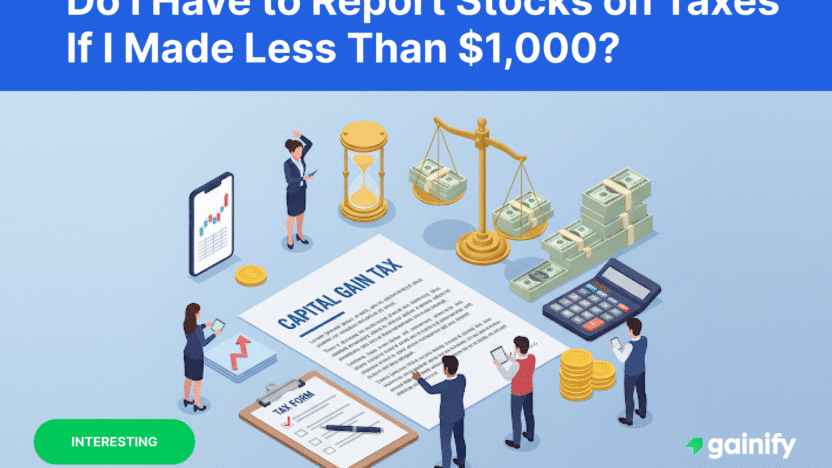Many new and experienced investors alike wonder if small amounts of stock market income need to be reported on their taxes.
The short answer is YES if your account is taxable, but the details depend on what kind of income you earned, what type of account you used, and how the IRS classifies that income.
There is no general exemption based on dollar amounts for stock sales or dividends in a taxable account.
The Internal Revenue Service requires that all realized gains, losses, and dividends be reported, regardless of whether they add up to $1 or $100,000.
However, the tax treatment differs depending on whether the income comes from capital gains, qualified dividends, non-qualified dividends, or whether the activity occurred inside a tax-advantaged retirement account.
This article explains the rules carefully, separating fact from misconception, so you know exactly when and how to report small investment income.
Do You Have to Report Stock Gains Under $1,000?
If you sold stocks in a taxable brokerage account, you must report the sale even if your profit was only a few dollars. The IRS requires that every stock sale be reported on Form 8949 and Schedule D. This applies whether you made a profit or a loss.
The key point is that reporting is based on whether a transaction occurred, not the dollar amount. Even if your net profit is $25 or $250, it still belongs on your tax return.
Why does this matter? Brokers send the IRS a Form 1099-B showing details of every sale, including date purchased, date sold, cost basis, and proceeds. Because the IRS already has this information, failing to include it on your tax return may trigger a mismatch notice.
Dividends: Qualified vs. Non-Qualified
Dividends are taxable in a taxable brokerage account, but how much tax you owe depends on whether the dividends are qualified or non-qualified.
Qualified Dividends
- Qualified dividends meet specific IRS requirements.
- They are typically paid by U.S. corporations or qualified foreign corporations.
- To qualify, you must also meet the IRS holding period rule (generally holding the stock for at least 60 days during the 121-day period surrounding the ex-dividend date).
- Tax rate: Qualified dividends are taxed at the same reduced rates as long-term capital gains: 0%, 15%, or 20% depending on your taxable income. This is a significant tax advantage for investors.
Non-Qualified (Ordinary) Dividends
- Non-qualified dividends do not meet the IRS requirements for favorable long-term capital gains treatment.
- These are sometimes called “ordinary dividends” and include payments from certain foreign companies, real estate investment trusts (REITs), master limited partnerships (MLPs), and some money market or bond funds.
- Tax rate: Non-qualified dividends are taxed at your regular ordinary income tax rate (the same as wages, interest, or short-term capital gains). This rate can be as high as 37% for the highest income earners.
Reporting
Your broker will send you Form 1099-DIV, which clearly separates qualified dividends (Box 1b) from total ordinary dividends (Box 1a). This form is also sent directly to the IRS. If you receive at least $10 in dividends, you will get a 1099-DIV, but remember: even if you earn less than $10, you are still required to report the income on your tax return.
What About Dividends in Retirement Accounts?
Whether you need to report dividends depends entirely on the type of account:
- Taxable Brokerage Account
- All dividends, interest, and capital gains must be reported on your annual tax return.
- This applies no matter how small the amount is.
- Your broker will send you a Form 1099-DIV for dividends and a Form 1099-B for sales, and copies are also sent to the IRS.
- Tax-Advantaged Retirement Accounts (401(k), Traditional IRA, Roth IRA, etc.)
- You do not report dividends, interest, or capital gains inside these accounts each year.
- In a 401(k) or Traditional IRA, the income grows tax-deferred. You only pay taxes when you withdraw money, and withdrawals are taxed as ordinary income.
- In a Roth IRA, the income grows tax-free, and qualified withdrawals (generally after age 59½ and meeting the 5-year rule) are not taxed at all.
Example: If you earn $500 in dividends in a taxable brokerage account, you must report it on your return for that tax year. If you earn the same $500 inside a Roth IRA, you do not report it, and if the withdrawal is qualified, you may never pay tax on it.
Capital Gains and Losses: Reporting Rules
These rules apply to investments held in a taxable brokerage account. If your stocks are inside a 401(k), IRA, or Roth IRA, you do not report gains or losses each year. Taxes are only due when you withdraw from a traditional retirement account, and qualified Roth withdrawals may be tax-free.
- Short-Term Capital Gains
If you sell a stock held for one year or less in a taxable account, the profit is taxed as a short-term capital gain. These are taxed at your ordinary income tax rate, the same rate you pay on wages. - Long-Term Capital Gains
If you sell a stock held for more than one year in a taxable account, the profit qualifies as a long-term capital gain. These gains are taxed at reduced rates of 0%, 15%, or 20%, depending on your total taxable income. - Capital Losses
If you sell a stock for less than what you paid in a taxable account, you record a capital loss. Losses first offset any capital gains. If your losses are larger than your gains, you can deduct up to $3,000 per year ($1,500 if married filing separately) against other income like wages. Losses above that amount can be carried forward to offset income in future tax years. - Why Reporting Matters Even if Gains Are Small
Even if your net profit across all trades is less than $1,000, the IRS still requires reporting for taxable accounts. Reporting ensures your gains are taxed properly and that your losses are tracked, which may save you money in future years.
Account Type | Do You Report Gains/Losses Each Year? | Tax Treatment of Gains | Tax Treatment of Losses |
Taxable Brokerage Account | ✅ Yes. Every stock sale must be reported on Form 8949 & Schedule D. | – Short-term gains (held ≤ 1 year): taxed at ordinary income tax rates (10%–37%).- Long-term gains (held > 1 year): taxed at preferential long-term capital gains rates (0%, 15%, or 20%, depending on taxable income). | Losses can offset gains. If losses exceed gains, up to $3,000 per year ($1,500 if married filing separately) can be deducted against ordinary income. Any excess can be carried forward to future years. |
Traditional IRA / 401(k) | ❌ No annual reporting. Trades, dividends, and gains are not taxed annually. | Gains and dividends grow tax-deferred. You pay ordinary income tax on withdrawals in retirement (not capital gains tax). | Losses inside the account cannot be deducted annually. A loss may only be recognized if all assets are distributed and the account is completely closed at a loss (rare and limited). |
Roth IRA | ❌ No annual reporting. Same rules as Traditional IRA for trades and gains. | Gains and dividends grow tax-free. Qualified withdrawals (after age 59½ and meeting the 5-year rule) are not taxed. | Same as Traditional IRA: no annual loss deductions. A recognized loss is possible only if the account is fully distributed and closed at a loss, and even then the deduction may be limite |
Common Misconceptions
- My profit was under $1,000, so it does not count. Incorrect. The IRS requires all stock transactions in taxable accounts to be reported, regardless of size.
- I reinvested dividends, so they are not taxable. Incorrect. Reinvesting dividends does not eliminate the tax obligation. You must still report them in the year they were received.
- My broker did not send me a 1099, so I do not have to report. Incorrect. If you earned taxable income, you must report it even without a form. The reporting thresholds apply to brokers, not to your obligation as a taxpayer.
- Tax-advantaged accounts are treated the same as taxable accounts. Incorrect. Retirement accounts shield you from annual reporting until distribution.
How the IRS Monitors Transactions
Every brokerage firm must file information returns with the IRS.
- 1099-B: Reports stock sales, including cost basis and proceeds.
- 1099-DIV: Reports dividends, separated into qualified and non-qualified categories.
- 1099-INT: Reports interest income.
Because the IRS already receives this information, failing to report even a $20 dividend or a $50 stock gain is likely to cause an IRS notice.
Key Takeaways
- Yes, you must report stocks on taxes even if you made less than $1,000 in a taxable account.
- Dividends and gains inside retirement accounts are not reported annually. Taxes apply only at distribution (or not at all for qualified Roth withdrawals).
- All dividends, whether qualified or non-qualified, must be reported in taxable accounts. Qualified dividends may be taxed at lower long-term capital gains rates.
- Capital losses can offset gains and reduce taxable income, even if gains are small.
- The IRS already receives your 1099 forms from your broker, so skipping small amounts is risky.
Final Word
There is no dollar threshold that excuses reporting stock sales or dividends in a taxable brokerage account. Whether you made $5, $500, or $50,000, it belongs on your tax return. The only time you avoid reporting annual investment income is when the activity occurs inside a tax-advantaged retirement account.
If you are uncertain about how to classify dividends, how to report capital gains, or whether your income qualifies for reduced tax rates, consult a licensed tax professional or financial advisor. Getting it right avoids IRS penalties and ensures you make the most of available deductions and credits.
⚠️ Disclaimer: This article is for informational and educational purposes only. It is not tax, legal, or financial advice. Tax laws are complex and subject to change. Your personal situation may require a different approach. Always consult with a qualified tax professional or financial advisor before making decisions regarding your investments or tax reporting.




